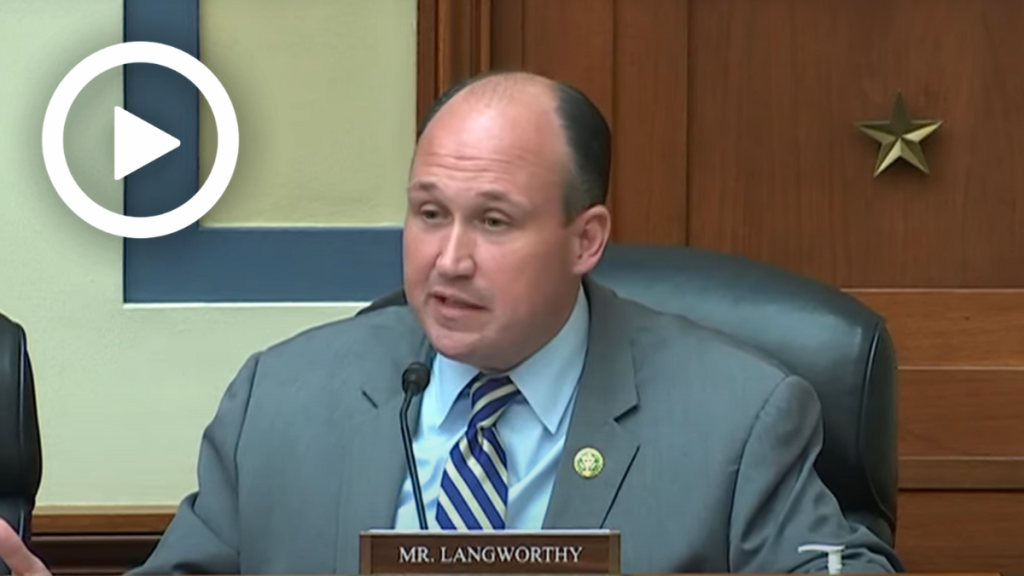Hearing Wrap Up: EPA’s Proposed Rules Strangle American Consumer Choice & Force Country into Radical Green Regulation Agenda
WASHINGTON—The Subcommittee on Economic Growth, Energy Policy, and Regulatory Affairs held a hearing titled, “Driving Bad Policy: Examining EPA’s Tailpipe Emissions Rules and the Realities of a Rapid Electric Vehicle Transition .” Subcommittee members discussed with witnesses how the EPA’s proposed rules constitute a radical and unrealistic shift in the automotive and transportation industry at the direct expense of American consumers, the U.S. economy, and our national security interests. Subcommittee members also discussed the excuses used by the EPA for not allowing two officials to testify before the subcommittee, emphasizing that EPA is not—nor should it want to be— immune to congressional oversight. Subcommittee Chairman Fallon and Chairman Comer sent a letter today demanding the EPA appear for a hearing in June.
Key Takeaways:
The EPA’s new proposed vehicle emissions standards rules attempt to force a radical increase in the number of EVs, strangle U.S. consumer choice, and impose the “strongest-ever” green regulation on traditional cars, trucks, other highway vehicles, and locomotives.
- Steve Bradbury—Distinguished Fellow at the Heritage Foundation—explained how the EPA’s proposed rules come at the expense of America’s families and are broad and overreaching: “If and when the American people feel the true effects of these rules—when they lose the vehicle options they love at the local dealership and find themselves stuck driving older and less safe cars, when the bottom falls out of the job market in the U.S. auto industry, when drivers cannot find convenient charging stations for their electric vehicles—in sum, when American voters realize what the EPA’s far-reaching regulatory enterprise has wrought for the nation, they will be angry… it is for Congress, and Congress alone, to make the monumental decisions that EPA is purporting to take upon itself in these proposed rules.”
The proposed standards would raise vehicle prices on Americans already under the grip of inflation and impose impossible-to-fulfill mandates on the auto industry given the U.S. electric grid and supply chains are nowhere near prepared to support this level of demand.
- Josh Roe—Chief Executive Officer for the Kansas Corn Growers Association—discussed how we are currently unprepared to implement the radical proposals from the EPA: “The proposed EPA standards allow the automakers to use a zero grams/mile compliance value for EVs and set emission standards such that the only way to comply is by shifting production to nearly 70% EVs in the next decade. Meeting those goals will be extremely costly, requiring a massive amount of public spending in electrical infrastructure, a complete retooling of auto production plants, and a change in where materials are source.”
Two EPA officials declined to attend the hearing and defend the EPA’s proposed rules, a blatant attempt to stonewall accountability and proper oversight. Chairman Comer and Subcommittee Chairman Fallon sent a letter to EPA Administrator Regan before the hearing expressing their disapproval over the EPA’s actions.
Member Highlights:
Subcommittee Chairman Rep. Pat Fallon (R-Texas) discussed with a witness the EPA’s groundless reasoning for not attending today’s important hearing.
Rep. Fallon: “As a former General Counsel for the Department of Transportation, do you agree with the EPA’s reasoning for their refusal?”
Mr. Bradbury: “No Mr. Chairman, I don’t. The EPA published close to 2,000 pages of detailed explanation and analysis explaining to the world its rules with plenty of questions to be asked about that detailed analysis. The experts at the EPA who are intimately involved in it, I think, should appear before Congress and answer questions.”
Rep. Fallon: “So it doesn’t square with you that those chairs are empty? It doesn’t make a lot of sense, at least, the excuse that they gave?”
Mr. Bradbury: “No it doesn’t, I would expect they probably briefed the press about the rule when they published it so that they could get favorable stories in the press so I think they could brief Congress.”
Rep. Byron Donalds (R-Fla.) laid out the infeasibility of the Biden Administration’s electric vehicle utopia.
Rep. Donalds: “True or false, President Biden says he wants 50% of new cars to be electric by 2030?”
Mr. Bradbury: “True, but I guess now it’s 60%.”
Rep. Donalds: “True of false, in order to meet Tesla’s EV needs – and this is only Tesla by the way – by 2030, global lithium supply must be increased by X times.”
Mr. Bradbury: “Oh it definitely has to increase somehow, we don’t know from where. But it has to increase greatly.”
Rep. Donalds: “True of false, a typical electric car requires six times the amount of mineral inputs than that of a conventional car?”
Mr. Bradbury: “Yes.”
Rep. Donalds: “True or false, nuclear energy is the most viable option for a steady stream of reliable, affordable, carbon-free electricity to power EV charging stations.”
Mr. Bradbury: “Yes, that is my understanding.”
Rep. Donalds: “If 50% of the cars were electric vehicle today, is there enough power on the electric grid to charge them all?”
Mr. Bradbury: “Absolutely not, no.”
Rep. Nick Langworthy (R-N.Y.) discussed the implications of EPA rulings and the harm done on market competition.
Rep. Langworthy: “It appears that these rulings convey a very distinct message and that is that the government chose electric vehicles as the winners and internal combustion engines as losers. That poses significant risks to both competition and innovation. Could you share your perspective on the relationship between the EPA rulings and the market competition?”
Mr. Kantor: “We are concerned that what this rule will do is push automakers to move their engineering resources and their focus of innovation away from internal combustion engines and just toward electric vehicles. Some of that is happening as a market measure anyway, and that’s great where it’s happening as a response to the market. But here, we think that gives us worse results than we would get otherwise.”
CLICK HERE to watch the hearing.


